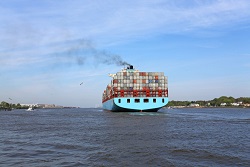
The European Parliament has voted in favour of including CO2 emissions from the shipping industry in the European Union's Emissions Trading System (ETS).
Maritime transport is the only sector with no specific EU commitments to reduce greenhouse gas emissions.
Parliament adopted its position on the European Commission's proposal to revise the EU system for monitoring, reporting and verifying CO2 emissions from maritime transport with 520 votes to 94 and 77 abstentions. The rules would require operators to buy EU carbon permits to cover emissions from voyages within Europe, as well as international trips that start or finish in an EU port.
MEPs largely agreed that EU and International Maritime Organisation (IMO) reporting obligations should be aligned. However, they said that the IMO has made 'insufficient progress' in reaching an ambitious global agreement on greenhouse gas emissions. They asked the Commission to examine the overall environmental integrity of the measures decided by the IMO, including the targets under the Paris Agreement.
Parliament believes that ships of 5000 gross tonnage and above should be included in the ETS.
Arguing that market-based emissions reduction policies are not enough, MEPs also want shipping companies to reduce their annual average CO2 emissions per transport unit for all their ships by at least 40% by 2030.
A proposed 'Ocean Fund' for the period from 2022 to 2030, financed by revenues from auctioning allowances under the ETS, would help make ships more energy-efficient and support investment in innovative technologies and infrastructure, such as alternative fuel and green ports. Of the total fund, 20% would contribute to protecting, restoring and efficiently managing marine ecosystems impacted by global warming.
Greenhouse gas emissions from global shipping activity are estimated to be around 2-3% of total global emissions. In 2017 in the EU, 13% of total greenhouse gas emissions from transport came from the maritime sector.
> Go to Transport industry homepage


